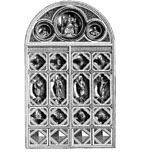
From the Narthex
Ed. Note: In this special section, which runs as an occasional feature, we present samples of the offerings in the Narthex, the NOR’s online blog. If you like what you read, visit newoxfordreview.org/narthex for more — much more! Our bloggers, in addition to those featured here, include Richard M. Dell’Orfano, Jason M. Morgan, and James Thunder. The Narthex is updated on a regular basis, so there’s never a shortage of NOR material to read!
How the Church Used to Welcome People
By John M. Grondelski
John M. Grondelski (Ph.D., Fordham) is a former Associate Dean of the School of Theology at Seton Hall University in South Orange, New Jersey. All views expressed herein are exclusively his.
The Octave Day of Easter — the Sunday following Easter — has gone by several names, including Divine Mercy Sunday and the Second Sunday of Easter. One of its oldest names is Dominica in albis, “Sunday in white,” because this was the day when those who had been newly baptized at the Easter Vigil historically took off the white garments they had received at their baptism.
Examining the catechumenate in the early Church provides valuable lessons for current discussions about the “welcoming” nature of the Church in the run-up to this fall’s Synod on Synodality.
In the early Church, those who were curious about Christianity could be inquirers. Inquirers were just that: they wanted to know more about Christianity. In antiquity, that process required a certain degree of circumspection because, until Constantine’s Edict of Milan in A.D. 313, the Church was buffeted between malign neglect and active persecution. (This is one reason why the first of the “minor orders” in the Church was porter: the person who kept the door. Even later, when persecution ceased, there were still porters, including holy men like St. André Bessette or Bl. Solanus Casey. They might offer assistance, but back then there was no general “open door” policy.)
Once an inquirer, under the inspiration of the Holy Spirit, decided to become a Christian, he was enrolled as a catechumen. He needed a sponsor for baptism. Godparents did not originate to confer some “honor” on a relative or friend; rather, in a world of persecution, an inquirer or catechumen needed somebody who was already Christian to vouch for him. Sponsors were the ecclesial version of background checks or references, vital in a world where infiltration of the Church could be a question of life or death.
You May Also Enjoy
Quebec's public life is a mess because Quebec's private life is a mess. Nationalist slogans don't fix human hearts. God does.
After the nuclear attacks on Japan, Gen. Curtis LeMay said, "There are no innocent civilians," and that's what Osama says.
One of the prime characteristics of the Church in our time is an almost complete absence of discipline, even in dioceses led by good bishops.

